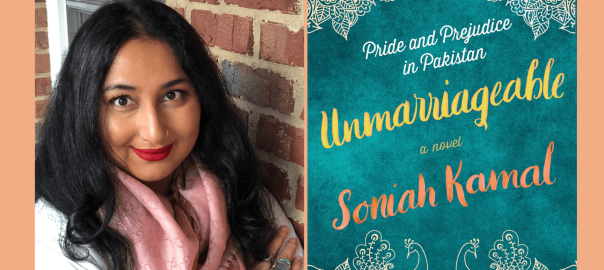BY JYOTHSNA HEGDE
It is a truth universally acknowledged that some stories like Jane Austen’s ‘Pride and Prejudice’ are truly timeless and deserve to be treasured and retold. Atlanta author Soniah Kamal’s ‘Unmarriageable’ sets Austen’s evergreen classic in contemporary Pakistan, yet manages to remain faithful to the original.
Kamal’s love for Austen is quite evident. Ubiquitous mentions of Austen and Pride and Prejudice throughout the narrative almost feature them as additional characters. Kamal stays very close to the original plot with even similar sounding character names – with Bennets being Binats, sisters Elizabeth, Jane, Kitty, Mary, and Lydia being Alysba, Jena, Qitty, Mari, Lady and so on. Such proximity to its roots also leads to inescapable comparisons with the classic.
A sudden fall from grace and money compels the Binats to relinquish their luxuries and settle down in a small town in Pakistan with sisters Alysba and Jena earning for the family as lit teachers at the British School of Dilipabad. No shrinking violet, Alysba battles established traditions of marrying girls off early to ensure their futures, with no identities for themselves. Mr. Binat is indifferent and chooses to remain silent. The girls are way past their “marriageable” age, with no prospects in sight, a matter of major concern for Mrs. Binat. Her desperate pursuit of eligible prospects often leads her to transform her daughters into “marriageable material” in any way or form that would impress a prospective groom.
Mrs. Binat’s wishes would seem to come true when the family is invited to wedding of the year, the arena to fish grooms. The maiden meeting of Valentine Darcee (Darcy), the dashing bachelor, swimming in inheritance, the catch of the century, so to speak, and Alys ends on a bitter note when Alys overhears Valentine mocking her reading Reader’s Digest and Good Housekeeping and also thinks she is average looking. The pride of Alys- who offers broader perspectives of life to her students than only envisaging themselves as exemplary wives- is hurt. She chooses to nurture the hurt. So, when she is told about an inheritance that Valentine wrongly usurped, she is more than willing to believe it. Alys and Valentine eventually battle their pride and prejudice to find love.
“That’s the thing about books. They let you travel without moving your feet,” says Jhumpa Lahiri about books. Unmarriageable, rooted in culture and brimming with ornate descriptions of clothing, food, mannerisms, and local viewpoints, organically transports the reader to small town Pakistan. Kamal’s detailing of food is so vivid that you can almost smell the chai and taste the kebabs. I certainly sipped my hot fix till the end.
And then there is the food for thought. “Can any amount of good ever merit interference of the empire? Not read literature? Erasing history is not the answer. Not deny it but not unnecessarily celebrate it.” Alys ponders over how a country can place lasting effects of the empire in proper context. Kamal’s profound insights about the effects of colonization and the identity crisis that stems from it are well expressed. Case in point is the part where Darsee tells Alys, “That book made me believe I could have a Pakistani identity inclusive of an English-speaking tongue. We’ve been forced to seek ourselves in the literature of others for too long.”
Kamal’s rich references to works in English and Urdu, skillfully incorporated into the narrative, enriches the reading experience. The author also weaves her love of books into the story, as when Alys reads from ‘Sunlight on a Broken Column’, given to her by Valentine, symbolically revealing her feelings for him.
A tour of the attractions in Pakistan helmed into the script, especially the closing of border gates ceremony at the Wagah Atari border, adds a nice touch.
While the vivacity of Unmarriageable proves to be its strength, human emotions unravel in a more layered way in the original. The romance that blooms between the lead pair seems a bit sudden. I quite enjoyed the banter between the sisters, and the mother and daughters, except in places when Lady seems unreasonably mean to Qitty.
Minor flaws aside, Unmarriageable, stewed with Kamal’s insights into culture and class distinctions, race and colonization, and a generous measure of sisterhood, love and marriage, simmers quite a succulent dish. Watch out for the spices!





